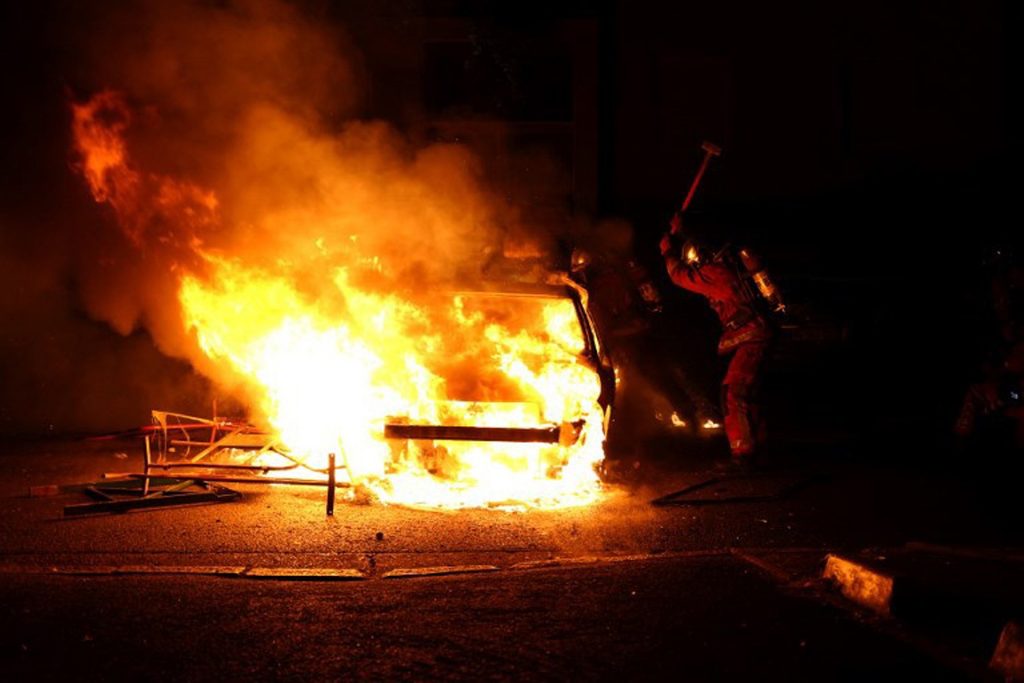Recent riots in France, sparked by the fatal shooting of a teenager during a police traffic check in Paris, have highlighted the role of social media in amplifying tensions and facilitating the spread of violence.
The circulation on social media of videos capturing police misconduct and the subsequent riots has ignited a broader debate about the influence and impact of social media during times of national emergency.
The anger and unrest over the 27 June shooting of Nahel Merzouk by a police officer in Nanterre, a suburb of Paris was exacerbated by the release of a video of the fatal incident on social media. The video, which contradicted the initial police version of events, went viral, sparking riots, violence and mass demonstrations across France.
The resonance of the video extended beyond the country of origin, with young people in Brussels also identifying with the victim and expressing their frustration with police misconduct in their own neighbourhoods. It reminded many of a similar case in Brussels in 2020, where a 19-year-old named Adil died in a police chase. The video of Nahel’s death in Paris prompted unrest in areas of the Belgian capital as long-held resentment once again bubbled to the surface.
In response to the riots, President Emmanuel Macron has raised the possibility of implementing restrictions on social media platforms during times of crisis. He expressed concerns about the role of social media in fuelling violence and called for dialogue with these platforms to regulate or potentially suspend access when necessary, remove sensitive content and help the authorities identify those inciting disorder.
Public order vs right to protest
Some have argued that such a heavy-handed approach is undemocratic. But others believe it may be necessary to maintain public order. The responsibility of social media companies in moderating content and complying with local laws is also under scrutiny.
Balancing freedom of expression with preventing violence and abuse on social networks remains a challenge. French President Macron's comments about potentially cutting social media during riots drew criticism, with similarities between authoritarian regimes. The government subsequently clarified that it does not currently intend to carry out such efforts but will focus on cooperation with platforms in content moderation and law enforcement efforts.
Social media platforms can serve as valuable sources of information and platforms for mobilisation during times of crisis. They have been instrumental in raising awareness about social issues, organising relief efforts, and facilitating community support. During the COVID-19 pandemic, social media played a crucial role in mobilising youth collectives to distribute food and resources to those in need. They can empower marginalised communities to share their stories and challenge dominant narratives.
Sensationalism
The downside of social media lies in its potential to exacerbate societal tensions and facilitate the spread of misinformation and incitement to violence. The French riots demonstrated how videos of violent acts and looting, filmed and shared by rioters themselves, amplified the unrest and encouraged copycat behaviour.
The selective nature of content shared on social media platforms also poses a challenge, as it often fails to provide the complete context of events, leading to potential misinterpretation and polarization.
Related News
- A tense Bastille Day as France deploys 130,000 police officers and bans fireworks
- France riots: Damage from violence cost an estimated €650 million
The ongoing debate regarding social media and its regulation underscores the delicate balance between preserving public safety and upholding democratic principles. It is crucial to differentiate between responsible content moderation and censorship that infringes on freedom of expression. This requires careful deliberation and collaboration among governments, social media platforms, and civil society. Responsible measures must be developed that protect both freedom of speech and public order.
"The problems do not come from social networks in themselves,” Victor Wiard, researcher in information sciences at the University of Saint Louis in Brussels, told RTBF. “I think these are societal problems that social networks can help to make visible and exacerbate, but they are not problems that are created by social networks themselves. I think without social media, there would have been riots. I don't think it's social networks that are responsible for young people going to the streets."
Axel Legay, a specialist in cybercrime and a professor at the École Polytechnique de Louvain, argued in the same article that without social networks there would probably have been riots, but that they wouldn't have been of this magnitude and this spread. W
"What's annoying about these videos is that we only see part of them," he concluded.

